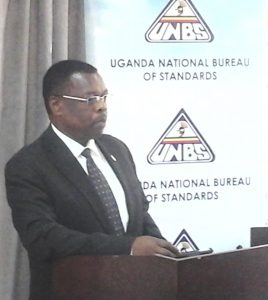Standards bureau plans to tougher stance next year
August 2, 2018—Dr. Ben Manyindo, Uganda National Bureau of Standards (UNBS) executive director, has said most of the goods bought and sold in the domestic market are substandard which is limiting Uganda’s international competitiveness and the reason why UNBS was going to toughen the rules next year.

Dr. Manyindo said although the Bureau is understaffed, it had managed to meet its targets last financial year and has introduced 254 new standards.
While sharing the annual performance review with the media in mid-week, Dr. Manyindo said the UNBS Voluntary Products and Systems Certification will now be made mandatory for a wide range of products
He said, “Under the new regulations use of distinctive mark regulations 2018 for all products will be required to gave the Q mark before being allowed on the market. This is intended to promote competitiveness of the local products on the regional and international market,” he said.
He said the organisation was going to crackdown hard on companies that were producing and importing substandard goods. UNBS has also decentralized its services to different regions with centres in Mbale (eastern), Gulu (northern) and Mbarara (western).
UNBS has also introduced 254 standards, 76 of these are compulsory covering foods and agriculture, management and services, chemicals and consumer products and the engineering sector.
“We have also introduced new standards for cement and lime, fertilizers, agricultural products like beans, coffee, and many others. These are directed towards improving agricultural production and improving standards for the real estate sector,” Dr. Manyindo said
Under the Import Inspection Function, UNBS inspected over 133,517 consignments. Some 52% of these were found to be substandard. The body also confiscated 413 metric tonnes of goods valued at UGX3.5 billion ($946,000) due to poor standards.
According to the report, UNBS has issued over 1,150 permits, 888 of these were awarded io central Uganda, 122 eastern region, 17 northern while 19 were 0ff-shore permits. The body also registered over 100% for all its targets in the last financial year.
Under the laboratory testing function, UNBS tested 14,472 samples against the target of 11,000 products. The body was also able to collect UGX1.7 billion (nearly $500,000) in non-tax revenue despite the shortfall from the government grant of UGX1.448 billion.
“These targets were achieved although we are short of staff. Currently we have 290 employees. This is only 45% of the required 640 staff the body requires to fully perform its duties,” Dr. Manyindo said

 African Heads of state head to South Korea next week for Summit talks
African Heads of state head to South Korea next week for Summit talks
 Trading leads as main source of income for Ugandans
Trading leads as main source of income for Ugandans
 New leadership for bankers’ umbrella as total assets top $12 billion
New leadership for bankers’ umbrella as total assets top $12 billion
 Brussels Airlines to announce Nairobi service
Brussels Airlines to announce Nairobi service
 SITA promises enhanced travel experience after Materna acquisition
SITA promises enhanced travel experience after Materna acquisition
 Saudia’s 105 aircraft order stretches A320neo lead over rival Max
Saudia’s 105 aircraft order stretches A320neo lead over rival Max
